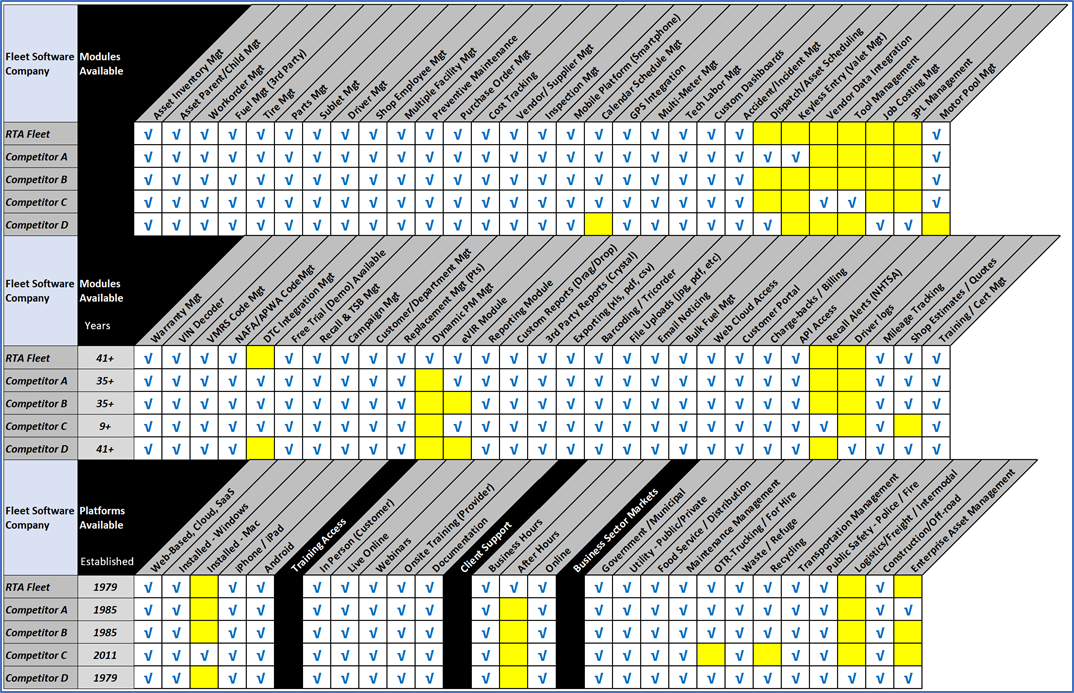Why Is RTA Less Expensive Than Its Competitors?
Why Is RTA Less Expensive Than Its Competitors?
I have used fleet management information systems (FMIS) since their early adoption during my extensive fleet career as an executive, consultant, and software product manager. Having been an early adopter of FMIS products (versus using index cards and magnetic boards to manage fleet assets), I have had the opportunity to purchase, deploy, and utilize many RTA FMIS competitors. Interestingly, during my fleet career paralleling RTA’s 40-year historical timeline, RTA was the one FMIS that I knew least about. My only real introduction to RTA was through peers and peripherally during consultation projects designed to help fleets succeed.
One of my first major assignments as the Director of Strategic Innovation with was to assemble a comprehensive “Competitor Analysis” to better understand the competitive landscape and the current position of RTA versus its competitors. Part of this assignment was to learn what the RTA FMIS offers to fleet managers and how it functions as a tool to help them. After going through extensive RTA FMIS training and having taught users how the system operates, I quickly became a chief advocate of the product.
RTA is in an enviable position to offer its software products and services at one of the lowest prices throughout the fleet software industry. Undoubtedly, this is due to RTA’s lower overhead and economies-of-scale leveraged over its 40-year presence in the industry.
Big Takeaway During the Competitor Analysis
Early on in this assignment, my first big takeaway was how much less expensive RTA was to purchase and deploy over its major competitors. This made me immediately wonder what RTA may be lacking compared to its competitors, so I assembled a feature matrix to compare various functions available across different platforms. What I found was surprising. Not only was RTA less expensive than its competitors, but comparatively it offered many, if not more, of the same features necessary to manage a fleet of assets.

Value of Fleet Management Information System
As I compared features versus costs, I found some competitors cost much more than RTA to purchase and deploy. This was partly through RTA’s ability to leverage years of experience and scale. Moreover, I found that RTA was playing in the same competitive sandbox as many of these major competitors, which made me wonder why companies would purchase a much more expensive product — especially in a competitive industry where fleets are constantly under pressure to justify their costs.
Next, I started reviewing many online feedback sites to understand what each FMIS user thought about the product they were using. What I found was surprising. Most of the RTA users were extremely loyal and satisfied with product features, much like its major competitors’ users. However, there were only two FMIS products whose users praised the quality and responsiveness of the customer support they received. RTA was one of them. Its users were more likely to laud the support they received than its competitors’ users. RTA users recognized the Five-Star Customer service rating was more than just mere words and a major reason for customer loyalty. In a time when phone button trees, voicemails and text-bots dominate the industry, customers appreciated a live person answering calls at RTA.
Bottom Line Analysis
RTA’s 41-year history in FMIS technology allows a unique ability to provide a high-quality and robust software solution that is competitive versus other companies in the industry. RTA recently built an online return-on-investment (ROI) tool for current and potential users to quickly calculate the value of using the RTA fleet software solution compared to its primary competitors. As we rolled out the ROI tool, we found rather amazing results showing large ROI advantages versus competitor website pricing models. Moreover, we saw similar ROI advantages that potential customers operating without an FMIS could benefit from.
As further evidence of its competitive pricing model and solution partners, RTA was recently awarded the 2021 Sourcewell Cooperative purchasing agreement in the fleet management category. A major bid criterion of this award was Sourcewell’s weighted point emphasis on price and value compared to RTA’s major industry competitors.
The bottom line, an FMIS can save fleets money. In addition, it allows fleets to catalog, analyze data, and make critical decisions to manage vehicles and equipment that ultimately lead to performance improvements and cost savings.
